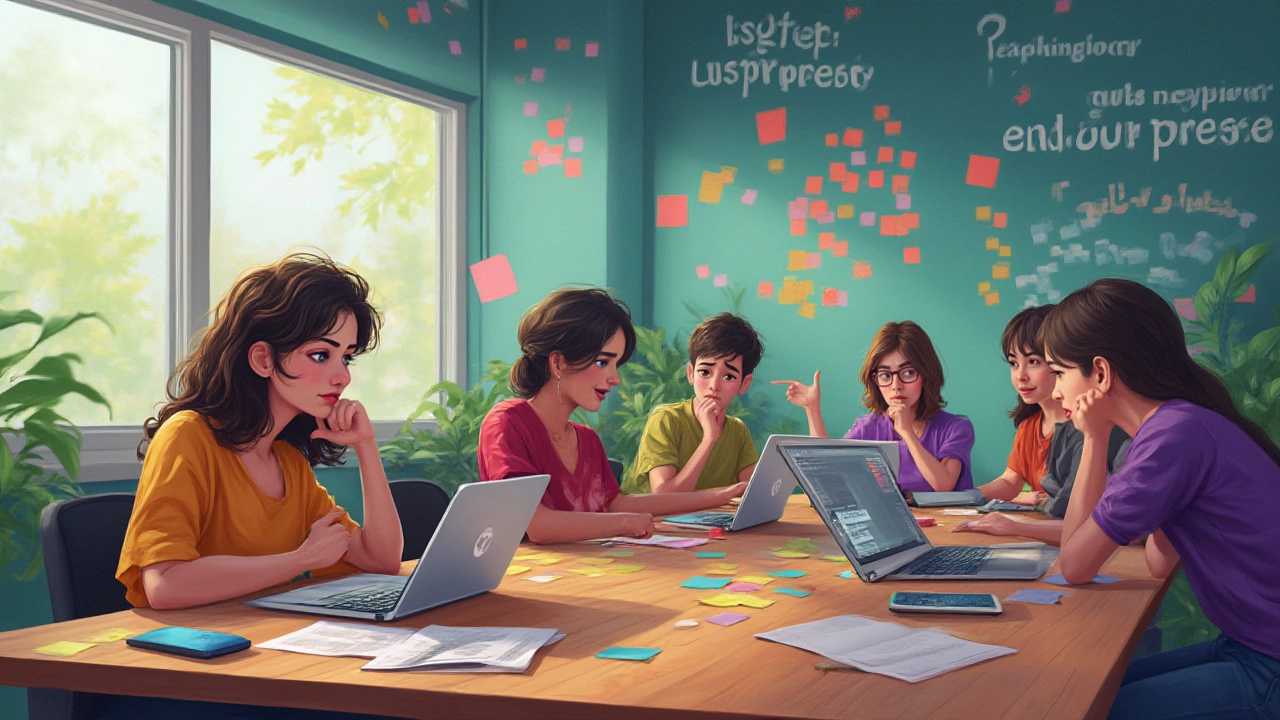Ever tried putting together furniture without a manual? That feeling of turning pieces around, looking at mysterious screws, and wondering if you’re the only one struggling — that’s coding, at least in the early days. There’s this image floating around: coders in hoodies, effortlessly turning coffee into software magic. But what’s it really like? Is coding all that tough, or just wrapped in a layer of tough-sounding jargon? If you’re thinking about learning to code, or switching careers into the world of software, you probably want more than glossy myths and horror stories from burnt-out programmers. You want the honest truth, and most importantly, you want practical tips to make your first steps smoother than my last attempt at assembling a new bookshelf (don’t ask how that went). Let’s get real about coding and what it actually takes to crack into this field.
Why Coding Feels Tough (And Why That’s Only Part of the Story)
The moment you stare at your first blank code editor, it’s easy to think, “What have I gotten myself into?” Syntax looks like a new language (because it is), error messages seem cryptic, and suddenly everyone is talking about algorithms as if they're recipes they've memorized. But is it really that tough — or does it just look intimidating from the outside?
Let’s break it down. At its core, coding is about giving very clear and specific instructions to a computer. There’s no room for guessing or being vague. Computers are literal — if you write ‘3+3’ when you mean ‘3*3,’ it won’t gently correct you. It’ll throw a fit and error out. This absolute strictness makes things tricky for beginners, who are used to people filling in conversational blanks. The upside? It teaches you precision that spills over into real-life problem-solving. Many beginners say their biggest hurdle isn’t the logic or maths — it’s dealing with frustration. Debugging (hunting for errors) can feel like searching for a missing earring in a shaggy rug.
Now for the juicy truth: coding is mostly about problem-solving, not raw brainpower. The industry loves to mythologize coding talent as some sort of ‘born genius’ thing. But a 2021 Stack Overflow developer survey found the majority of professional coders started with zero experience and just stuck with it. That’s telling, isn’t it? Patience and persistence matter more than brilliance. In fact, a well-known study by Google, codenamed "Project Aristotle", discovered their most productive and creative teams scored highest for traits like empathy and resilience—not technical expertise. You can learn syntax, Google error messages, and find communities to ask for help. Emotional grit is what keeps you going.
What makes coding seem tough is the endless learning curve. Technology never sits still. Just when you master one language, a new one turns up trending on GitHub. But here’s a secret: most coders rarely know everything they’re expected to know. They Google. A lot. The skill isn’t in memorising everything, it’s in knowing how to learn on the fly. Data from a 2024 Github report showed that even experienced developers look up basic commands and documentation daily. You’re not supposed to remember it all.
Learning to code, especially as an adult, can bring its own challenges. There’s the time commitment, impostor syndrome, and sometimes outdated or confusing resources. But that first spark when your code actually works? Honestly, that tiny success feels like magic. It’s addictive. The journey is tough, not because of the information, but because sticking with it when you hit setbacks is its own battle. You don’t need to be a maths wizard — you need to be curious, stubborn, and okay with failing forward.
The Day-to-Day Realities of a Coding Job
So, you’ve survived your first coding lessons. What’s it actually like to do this every day as a full-time job?
You might expect software developers to spend most of their time frantically typing code straight into the Matrix. Reality check: according to a major 2023 JetBrains Developer Survey, coding takes up roughly 40-50% of their day. The rest? Meetings, chatting on Slack, writing documentation, reviewing other people's code, and sometimes helping people with computer basics. Even if the code is front and center, it’s rarely just about hammering away at a keyboard.
If you hate teamwork or can’t stand waiting for someone else to finish a task, coding jobs might frustrate you. Real software is almost always a team effort. You'll collaborate with designers, testers, clients, and product managers — and sometimes you’re the bridge between people who speak ‘tech’ and those who absolutely don’t. Communication skills count just as much as technical chops. Managers love devs who can explain tricky stuff in plain English.
Deadlines can pile up, and—here’s the bit nobody tells you—the ‘easy fix’ often snowballs into hours of tracking down a single missing bracket or quirky bug. But honestly? It’s not all stress. Most teams value downtime and flexibility. Remote and hybrid setups are common, and many companies care more about results than how many hours you clock in each day. If you love solving puzzles (think Wordle, sudoku, or even a good whodunit), you’ll find software tasks rewarding. There’s that little adrenaline rush when you finally solve a tough bug, and yes, high-fives in the Zoom chat happen more than you’d think.
Of course, there are downsides. Eyestrain, wrist pain, and that ‘trapped in a chair’ feeling can creep in. But most good workplaces give regular breaks, standing desks, and perks to keep burnout at bay. Some even set up “no meeting” days, so developers can, well, actually develop stuff. Here’s something you really should know: coders talk more about their failures and bugs than their successes. If you spend your first few months feeling lost, you’re not the only one.
Income, though? That’s tough to beat. According to the UK Office for National Statistics, the median salary for software developers in 2025 is £56,800 — well above the national average. Fair pay isn’t universal, but coding skills are in high demand everywhere from fintech in London to startups in Manchester (my home city). It means you can often pick where you live or even work freelance for more flexibility.
| Job Role | Median UK Salary (2025) | Remote % of Roles |
|---|---|---|
| Junior Developer | £35,200 | 48% |
| Software Developer | £56,800 | 59% |
| Senior Developer | £77,300 | 67% |

Cracking the Challenges: Strategies to Make Coding Less Tough
Alright, so coding has its bumps — no reason to sugarcoat it. But you can absolutely make the road smoother. First tip? Ditch perfectionism. Beginners fall into the trap of wanting the perfect solution before they’ve even got a working one. News flash: messy code that runs is miles ahead of perfect code that never leaves your computer. Experienced devs will tell you, write ‘ugly’ code if you must — you can always tidy up later.
Set realistic goals. You can’t build the next TikTok after a week of learning HTML. A much better plan: break problems into bite-sized objectives. Today, maybe you get a button working. Tomorrow, make it change colour. These wins add up — and celebrating those little milestones is what keeps your motivation alive.
Find your community. There are endless online spaces for coders, from Stack Overflow to tiny Discord servers just for beginners. Don’t be afraid to ask questions. Even ‘stupid’ ones. The most successful coders are those who know how to ask for help (and then pay it forward). Meetup groups, coding bootcamps, and local hackathons in cities like Manchester, Birmingham, or Liverpool are buzzing with learners just like you. You won’t believe how quickly you pick things up when you see someone else bang out a solution live. And hey, if you hit a brick wall, sometimes just venting to people who get it is all you need.
Practice with purpose. Don’t just watch video tutorials or read articles; build real things, no matter how silly. Make a to-do list app. Automate your bedtime playlist. Create a random compliment generator — your mates will think it’s fun, and you’ll learn important problem-solving skills. Tackling real (even tiny) problems teaches you way more than endless theory. There are even coding challenge sites like LeetCode, Codewars, or FreeCodeCamp, which offer structured practice and instant feedback.
One underrated trick? Document your journey. Keep a notebook or blog where you jot down the problems that stumped you and the eventual solution. Not only does this build a habit of reflection, but months later you’ll laugh at how far you’ve come. When you’re feeling stuck, looking back through your notebook is a huge confidence boost.
If you ever feel imposter syndrome — that sense of “everyone knows more than I do” — know it hits everyone. Even senior engineers admit to secretly Googling ‘How to center a div in CSS.’ The trick is admitting what you don’t know and being open about it. Transparency beats bravado ten times out of ten. Adopt the mindset that every bug is an opportunity for a new trick in your toolkit.
Let’s not kid ourselves: tech moves quickly. New frameworks and languages pop up so often it can feel impossible to stay up to date. Focus on fundamentals, not just buzzwords. If you have a solid understanding of logic, problem-solving, and basic structures (like loops, conditionals, and types), you can pick up any new tool in record time. No matter what language you start with — Python, JavaScript, Ruby — you’re learning how to think in code, and that’s what matters long run.
If frustration ever gets the better of you, walk away for a bit. Sometimes the solution pops into your head while making tea. Fresh eyes solve more bugs than staring at the code till midnight. It sounds counterintuitive, but making space from the screen is a tactic top developers swear by. That, and a healthy supply of your beverage of choice.
Who Should (and Shouldn’t) Consider a Coding Career?
So is coding for everyone? Hard truth—no, and that’s okay! You don’t need to force yourself into tech because the salaries look shiny or because “everyone’s learning to code.” If you love solving puzzles, enjoy thinking logically, and get a kick out of making something from nothing, you’ll fit right in. But if you deeply dislike troubleshooting or feel drained by computer-heavy work, it’s fine to explore other careers that light you up.
People who thrive in coding usually share a few traits. They’re curious, persistent, don’t mind tinkering for hours, and find satisfaction in small wins. It helps to enjoy learning, since you’ll do it non-stop. If you love starting with a blank page and iterating until things feel just right (like building LEGO sets without instructions), software jobs will keep you happy. Scrappy, self-taught backgrounds are the norm. Many successful developers came from completely unrelated fields — teachers, musicians, even chefs. The common thread? A willingness to dive deep into problems and not give up at the first error message.
When it comes to formal education, coding is one of the few industries where a degree is helpful but not mandatory. Sure, a computer science background can smooth your entry, especially for giant firms. But thousands of developers land great jobs after completing bootcamps, online courses, or just learning on their own. What matters: a portfolio showing real work, plus the grit to explain your thinking during interviews. In fact, 2025 hiring studies from LinkedIn show that many UK employers now value practical coding assessments and GitHub profiles far above traditional CVs. Side projects, freelancing, and open-source contributions make your learning visible and attractive.
Coding isn’t a solo sport, unless you really want it to be. Most jobs are collaborative. If you like sharing, taking feedback, and sometimes defending your idea in a mini-argument (“Is this navbar blue or green?” type debates), you’ll enjoy the pace. If tiny changes or prolonged tasks leave you fuming, or if you crave constant variety and dislike repetition, be aware that some parts of coding (like bugfixing or documentation) can feel monotonous.
Still, the rewards are generous: flexible hours, above-average pay, remote options, and a clear path for advancement. If you want to move from coding to team leadership, product design, or even tech writing, having a developer background opens all sorts of doors. Last year at a Manchester tech conference, someone joked that ‘coding is the gateway language to everything in digital.’ She wasn’t wrong.
If you’re considering coding purely because of the money, pause. The learning curve needs real drive. If you want in because you love technology, want to work remotely, or enjoy the idea of making things that others use, you’ll have a better shot at turning your initial struggles into success. Coding isn't easy, but it isn’t reserved for geniuses either. With the right mindset, anyone curious and committed can get pretty damn good at it—and the world desperately needs more people who know how to bridge the gap between humans and computers. Fancy becoming one of them?





